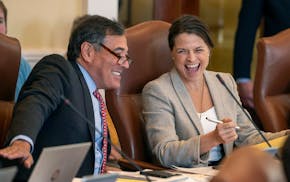WASHINGTON -- Geography and philosophy may have mattered more than party Monday in determining how individual U.S. House members voted on the ill-fated $700 billion financial rescue package. Minnesotans in the House were just as divided as their peers -- and just as bipartisan in rejecting the plan.
Four members of the state's eight-member delegation voted no. Two were rural Democrats, and two were suburban Republicans. Three Minnesota Democrats and one Republican voted to approve the plan.
As a result, the state's breakdown exactly matched the House as whole, where two-thirds of all Republicans and 40 percent of all Democrats joined in voting no.
In the impassioned debate before the vote, some members candidly spoke about fears of voter reaction to the plan. "We're all worried about losing our jobs," declared Rep. Paul Ryan, R-Wis. "Most of us say, 'I want this thing to pass, but I want you to vote for it -- not me.'"
After the bill's rejection, House Minority Leader John Boehner, R-Ohio, acknowledged that "Americans are angry, and so are my colleagues. They don't want to have to vote for a bill like this. But I have concerns about what this [vote] means for the American people."
The House website was overwhelmed as millions of computer users left messages for their representatives or sought information about the bill.
"We haven't seen this much demand since the 9/11 Commission report" was posted on the site in 2004, said Jeff Ventura, spokesman for the House chief administrative officer.
Real frustration
Conservatives in the House saw too much government interference in free markets and too high a price. Liberals thought it provided too much help for Wall Street and not enough for distressed homeowners.
"There's a real sense of frustration. People see their tax dollars spent bailing out financial institutions, and they themselves are not doing well," said Rep. Elijah Cummings, D-Md., who represents a predominantly black Baltimore district. He voted no.
From the opposite end of the political spectrum came conservatives such as Rep. Jeb Hensarling, R-Texas.
"This Congress ... did not adequately discuss or investigate potential alternatives that would have constituted a workout and not a bailout," he said.
Minnesotans voting against the rescue plan voiced similar complaints.
Democratic Rep. Tim Walz, who represents the largely rural First Congressional District along the state's southern border, said the bill didn't offer enough protection to homeowners.
"When [the bill] talks about foreclosures ... it talks about how it 'encourages' them [officials] to reduce foreclosures," Walz said. "Well, 'encourages' is a pretty vague word."
"Because this bill was considered in such haste, without adequate hearings or debate, nobody knows what this complex financial scheme will produce," said Republican Rep. Jim Ramstad from the west-suburban Third District. "The final cost to taxpayers is uncertain."
Ramstad advocated a plan for Congress to provide insurance to mortgage-backed securities.
Rep. Michele Bachmann from the Sixth District north and east of the Twin Cities criticized the proposal as "rushed, unworkable and short-sighted," instead advocating for a plan that suspends business and capital-gains taxes and requires firms to insure their own troublesome assets.
"I support a plan that would have Wall Street bail itself out, not hardworking taxpayers," she said.
Democratic Rep. Collin Peterson of the Seventh District, representing the state's northwest quadrant, also voted no.
Flawed but urgent
Minnesota members who backed the legislation agreed that it was flawed, but pointed to the urgent need for action.
"If this bill fails to pass, the American economy and every family's financial future will be in the hands of the global markets -- at which point Congress will lose the opportunity to prevent a collapse," said Fourth District Democratic Rep. Betty McCollum, who represents St. Paul and its first-ring suburbs.
"Every American with a job, a pension or bank account has a stake in seeing this crisis resolved," she added.
Democratic Reps. Keith Ellison, from the Minneapolis-centered Fifth District, and Jim Oberstar, the dean of the delegation representing the state's northeast, joined McCollum in voting yes.
"The result was imperfect, but it was a bipartisan solution that I believed was in the best interest of Americans," said Rep. John Kline of the south suburban Second District, the only Minnesota Republican to vote for the package.
House leaders plan to further negotiate and reconvene Thursday, saying the need for action has only increased.
"I think that we need to renew our efforts to find a solution that Congress can support," said Boehner.
The Associated Press and McClatchy Newspapers contributed to this report. Mitch Anderson • 202-408-2723
The Latest | A second seated juror dismissed by judge from Trump's hush money trial

Biden scores endorsements from Kennedy family, looking to shore up support against Trump and RFK Jr.

